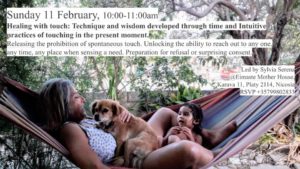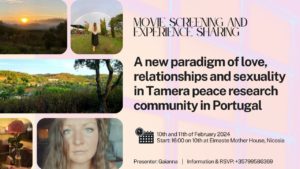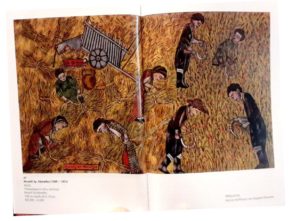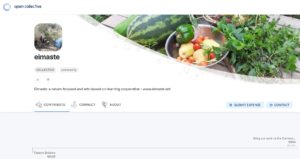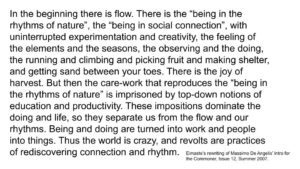
Ελληνικά πιο κάτω
workshop with Chrystalleni Loizidou & Hülya Dede
at Phytorio, Visual Artists Association
4 November, 18 November, 2 December | 10:30am- 12:30pm
In the beginning there is flow. There is being in the rhythms of nature, a sense of belonging, with uninterrupted and unobserved experimentation and creativity. There is the feeling of the elements and the seasons, the observing and the doing. There is running and climbing and picking fruit and making shelter. And getting dirt between your toes. There is the joy of life and gratitude for the gifts of nature. Until the care-work that allows being in the rhythms of nature becomes imprisoned by practices of imposed education and productivity that disconnect us from flow and from our natural rhythms. Being, feeling and doing are turned into work and people into things. Thus the world is crazy and revolts are practices of rediscovering connection and rhythm. For this, we wish to share, remember, and develop with you customs of mindful presence and connection and belonging, by bringing together elements from Waldorf Steiner education which focuses on artistic rituals of skill development and transmission, from the Forest School movement and its emphasis on free learning in the forest, along with rescued traditions of premodern Cypriot upbringing.
This series of workshops is a collaboration between Είμαστε and Eğitim Sanatı Derneği / Association for the Art of Education, and have been previously hosted by the Connective Artistic Practices Symposium 2022 (Fontys University, Tilburg Netherlands) and the Deep Commons Conference (Department of Government and Politics, University College Cork, Ireland in association with Le Terre Institute for Community and Ecology, Mississippi, USA. The latest piece authored by the group is entitled “Connective practices towards a radical politics of community-integrated learning and care across the divisions of Cyprus: Some learning points around making kin, cooperative pedagogy, and freedom-respecting technologies” part of the forthcoming SUNI Press publication “Deep Commons: Cultivating ecologies of solidarity and care beyond capitalism, patriarchy, racism, and the state”.
Participation: 60€ (20€ x 3)
This workshop is addressed to parents and children, educators and individuals who share an interest in education as the cultivation of ways of being and working in harmonious co-presence with children and other adults in a spirit of play and creativity. It includes elements of speculative experimentation, handicraft, play through movement, song, and the co-creation of environments for free-play. Facilitation languages: Greek, Turkish, English.
For more information: 99586369
εργαστήρι με Χρυσταλλένη Λοϊζίδου & Hülya Dede
Oίκημα Φυτωρίου Εικαστικής Δημιουργείας
4 Νοεμβρίου, 18 Νοεμβρίου, 2 Δεκεμβρίου | 10:30 π.μ. – 12:30 μ.μ.
Στην αρχή υπάρχει ροή. Η ύπαρξη στους ρυθμούς της φύσης, η αίσθηση του ανήκειν, με αδιάκοπο απαρατήρητο πειραματισμό και δημιουργικότητα, η εμπειρία των στοιχείων και των εποχών, η παρατήρηση και η πράξη. Το τρέξιμο, το σκαρφάλωμα, το μάζεμα φρούτων, η κατασκευή καταφυγίων και η άμμος ανάμεσα στα δάχτυλα των ποδιών μας. Η συνύπαρξη μέσα στη χαρά ζωής και την ευγνωμοσύνη για τα δώρα της φύσης.
Μέχρι που η φροντίδα-εργασία που επιτρέπει την ύπαρξη σε φυσικούς ρυθμούς φυλακίζεται από πρακτικες επιβεβλημενης εκπαίδευσης και παραγωγικότητας που μας αποσπούν από τη ροή και από τους φυσικούς μας ρυθμούς. Η ύπαρξη, η αίσθηση και η πράξη μετατρέπονται σε δουλειά και οι άνθρωποι σε πράγματα. Για αυτό, η επανάσταση ενάντια στην αποξένωση είναι η φροντίδα και η μετάδοση πρακτικών ανάκτησης σύνδεσης και ρυθμού. Επιθυμούμε να μοιραστούμε έθιμα συνειδητής παρουσίας, σύνδεσης και ενίσχυσης της αίσθησης του ανήκειν, ανακαλώντας μια διευρυμένη έννοια της ευγνωμοσύνης-συγκομιδής και των τραγουδιών, χορών, παραμυθιών, και τελετουργιών της.
Προηγούμενες μορφές αυτής της εργασίας-φροντίδας υποστηρίχθηκαν από το Συμπόσιο Artistic Connective Practices (Fontys University, Tilburg Netherlands 2022) και το Deep Commons Conference (Department of Government and Politics, University College Cork, Ireland σε συνεργασία με το Le Terre Institute for Community and Ecology, Mississippi, USA). Η ομάδα (www.eimaste.net) συμμετέχει με το κεφάλαιο “Connective practices towards a radical politics of community-integrated learning and care across the divisions of Cyprus: Some learning points around making kin, cooperative pedagogy, and freedom-respecting technologies” στο επερχόμενο βιβλίο του SUNI Press “Deep Commons: Cultivating ecologies of solidarity and care beyond capitalism, patriarchy, racism, and the state”.
Συμμετοχή: 60€ (20€ x 3εργαστήρια)
Το εργαστήρι, δομημένο σε τρεις δύωρες συναντήσεις, απευθύνεται σε γονείς, εκπαιδευτικούς ή άτομα που ενδιαφέρονται για την εκπαίδευση ως καλλιέργεια συντροφικότητας στην μαθησιακή πορεία των άλλων, αρμονικής συνύπαρξης και συνεργασίας με παιδιά και άλλους ενήλικες, μέσω παιχνιδιού και δημιουργικότητας προς μια ανθρώπινη μελλοντική κοινωνία. Συμπεριλαμβάνει εργασία με πηλό, τραγούδι, ελεύθερο παιχνίδι, προετοιμασία απλού γευματος, συνειδητή συνδημιουργία περιβάλλοντος για ελεύθερο παιχνίδι, ζωγραφική και χειροτεχνία. Γλώσσες εμψύχωσης: Ελληνικά, Τούρκικα, Αγγλικά
Πληροφορίες: 99586369
